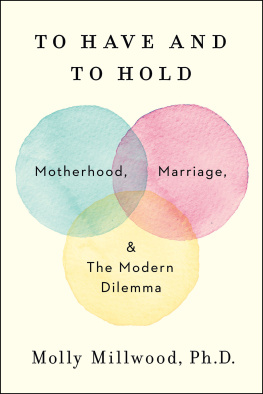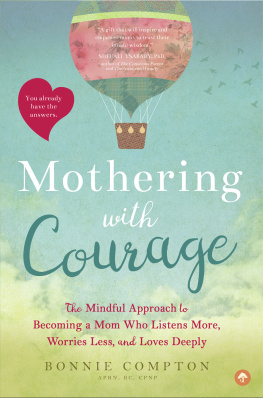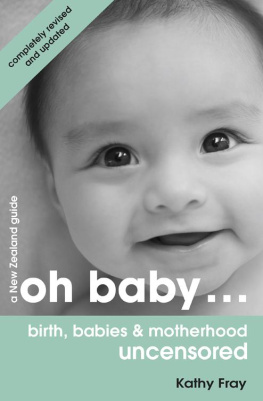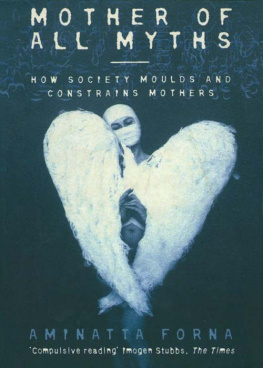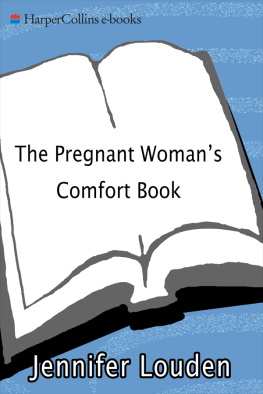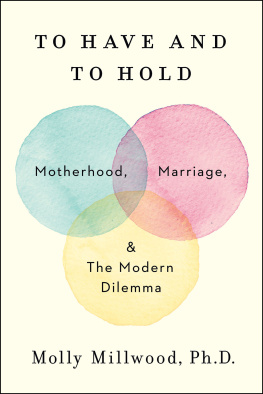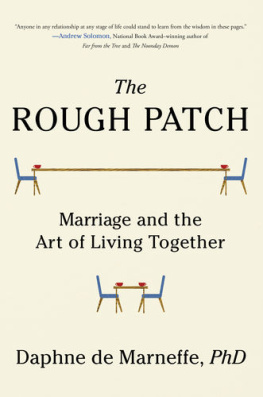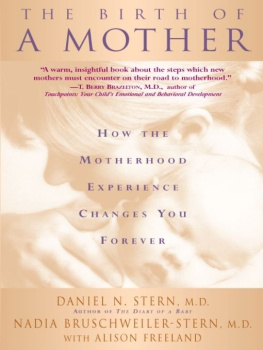Contents
For Ari, Noah, and Quinn
my teachers, my inspirations, and my reasons for pursuing an ever-greater understanding of what it means to love and be loved
When my first son was born, I lamented the scarcity of books about what motherhood is really like. Why, I wondered, were there so many books dedicated to pregnancy, childbirth, and caring for a baby, and so few books that explored how a womans internal experience changes so radically when she becomes a mother? Eventually I discovered that several such books do exist, and in the last few years, there has been a flurry of honest writings (largely in blog or other online forms) about the actualnot romanticizedexperience of becoming a mother. Why are these kinds of accountsfull of the promise of restoring sanity to new mothers everywhereso heavily outnumbered by the how-to books about parenting? Why are they not standard baby shower gifts, and why are their titles not nearly as familiar to all pregnant women as, say, What to Expect When Youre Expecting?
I believe it has something to do with the fact that our culture values a mothers skill at parenting over her well-being as an individual. Nobody recommended these other books to me as I approached motherhood. I had to dig deep to find them.
The taboo against exposing the complexity of motherhood has a long history in our society. I am not forging any new territory by acknowledging that such a taboo exists or by offering candid accounts of maternal suffering in these pages. I am simply adding my voice to a chorus thats too small, a chorus we must strain our ears to hear amid the much louder sounds of how lucky we are to have a new baby and how we should go about taking care of that baby. As a psychologist, I find the secrecy and shame surrounding the struggles faced by new mothers both crippling and dangerous. As the mother of two young children, I wanted to write the book I longed to read when motherhood was brand-new to me: a narrative that explores the emotionally and psychologically complex terrain of new motherhood. In that terrain, we encounter not only a womans internal experience of herself, her child, and her radically changing identity, but also her experience of her marriage or intimate partnership.
Too much of the existing literature on motherhood, both scholarly and popular, diminishes or completely overlooks the relational context in which motherhood occurs. Certainly, mothering is recognized as relational in nature; mothering is about interacting with our children. What gets less attention is that motherhood, as an experience and identity, usually unfolds within the context of an intimate adult relationship. Experiences of loss, separation, power, control, autonomy, dependency, and conflict within a womans romantic partnership are, at various times, either background or foreground in the experience of motherhood. These issues simply cannot be disentangled from the supposedly individual ones that characterize new motherhood, like mental and physical exhaustion and loss of personal freedom.
So this book is not about womens individual happiness within motherhood, or about marital happiness after the transition to parenthood. It is about both.
Too often, personal contentment and relationship harmony are pitted against each other, as if we must sacrifice one, at least to some degree, in order to achieve the other. Likewise, a womans desire to mother and her desire to do other things are also pitted against each other. These are false dichotomies. What if we could instead occupy a mental space in which there is room for all our loving, nurturing feelings toward our children and our partners and room for all our other, less socially acceptable feelings, too? We get tired of nurturing. We long for freedom and breathing room. We savor opportunities to become immersed in other kinds of tasks and experiences that are meaningful to us, yet we often feel guilt or shame for prioritizing our own needs and desires.
What if we could be free of confusion about these seemingly incompatible sets of feelings? What if we could be free of the self-disdain that says, If I were a good mother, I would want to stay home full-time with my baby or I shouldnt meet my friend for dinner when I barely have time to cook or have dinner with my husband? What if we could trust that as long as we are intentional in our choices and clear about our needs, whatever it is we are doing to take care of ourselves also makes us better mothers, and that whatever time we take away from our partners to do something meaningful actually breathes new life into our relationships?
So many of the women who come to me for therapy are tormented by their own ambivalence. They want more time with the baby, but also more time alone. Their children bring them indescribable joy, but also make them crazy. They are grateful for their husbands calm and stability while simultaneously resenting them for being less affected by the transition to parenthood. They are crying in hopeless frustration one moment and feeling surges of love and affection deeper than theyve ever known in the next. Im losing my mind, these women say. No, youre not, I respond. Youve lost many things now that youre a mother, but your mind is not one of them. In actuality, these women have found their minds; they have found crevices and corners they didnt know existed and hadnt planned to visit. The same is true of their hearts.
Im guessing you picked up this book because, like the women Ive just described, youre wondering whats become of your life and your marriage since youve become a mother. You think maybe youre losing your mind, too. In this book, we will take a look at what you have lost: a great deal of your personal freedom, any semblance of order and simplicity in your life, your idealized pre-baby notions of what kind of mother you would be, your pre-baby fantasies about the ways parenthood would enhance your marriage, and many other things you held dear. Those losses need to be recognized and grieved, but even more important than this is the need to make sense of what new things youve found. We will shine a light on the thoughts, feelings, and parts of self you have discovered since becoming a mother, and look upon them with curiosity and acceptance rather than shame. We will look bravely at the emotional chaos of motherhood and tame it with meaning. Reading this book wont make the chaos go awaymuch as I wish it wouldbut my hope is that it will become much more bearable. All of whats painful, messy, and confusing in life becomes easier to bear when we stop trying to make it go away, when we learn that others have found themselves in the same tangle, and when we find words to bring us reasons and meaning.
Everything in this book is written from my vantage point as a clinical psychologist who has spent many an hour in dialogue with new mothers and couples muddling their way through the haze and emotional turmoil of early parenthood. I write also from my vantage point as a psychology professor and scholar with specialties in intimate relationships and the transition to parenthood. But perhaps most important, I write as a mother and a wife. I would be doing my readers a great injustice if I pretended that my psychologist status somehow rendered me immune to all the struggles described in the pages that follow. After all, greater transparency about the many ways in which motherhood rattles us is the very thing I wish for. What plagues so many new mothers, what adds a layer of unnecessary suffering to the inevitable pain, is the shame in which they are enshrouded because they think they are the only ones having such a hard time. If I maintained a fully professional voice throughout this book, describing my observations from a detached, clinical, or academic perspective and never speaking of my personal experiences, I would be reinforcing the misconception that most women are sailing smoothly through the seas of new motherhood and only a few unlucky ones are floundering. So, although this book incorporates research findings, the narratives of my clients, and the themes that arise with such regularity in my clinical practice, my own stories will reveal that I relate to those themes on a deeply personal level.

